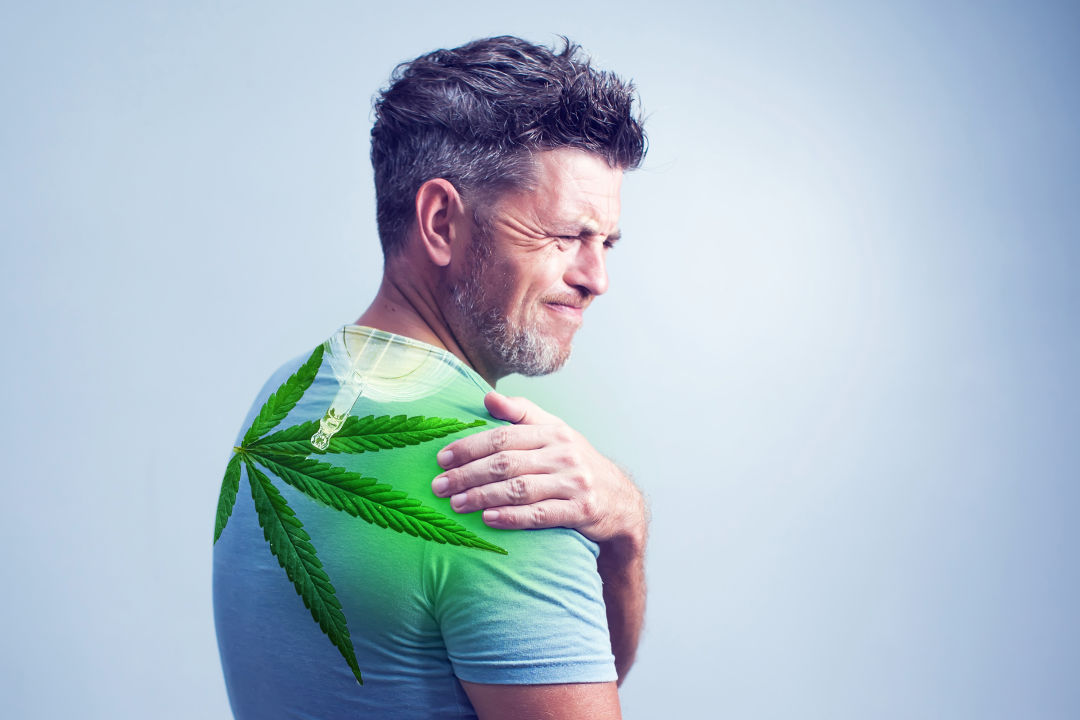What's Better for Chronic Pain: CBD or THC?

If you suffer from chronic pain—that is, debilitating pain that persists for three months or more—you're not alone. More than 20 percent of Americans are affected by it at any given time. While most people with chronic pain are prescribed opiates—which can cause addiction and a wide range of negative side effects, both for individuals and cities and states—new information shows that more than 62 percent of people with a medical marijuana card are using cannabis for chronic pain.
In fact, a new study published by the Annals of Internal Medicine has found that when it comes to chronic pain, products with a higher THC-to-CBD ratio were associated with a "moderate improvement in pain severity" in individuals.
These findings, which were gathered from 25 studies and 15,000 participants, may come as a surprise, since CBD has been marketed as a miracle elixir for pain and anxiety. It's sold in food, drinks, oils an lotions, and it comes with a laundry list of purported benefits.
While those benefits may be real, Dr. Daniel Stein at Neurology of Cannabis says it would take a lot of CBD to feel the therapeutic effects companies are suggesting.
Stein, a board-certified neurologist who's practiced in Sarasota for 30 years, has been studying the effect that cannabis has on pain receptors and the nervous system. He frequently prescribes cannabis to patients experiencing chronic pain, but he says the cannabis formulation he administers depends on the type of pain they're dealing with.
"If patients have neuropathic pain, they typically respond better to THC," Stein explains. That's because THC binds to the body's natural cannabinoid receptors within the nervous system and brain. However, "if the patient are dealing with inflammatory pain caused by conditions like inflammatory bowel disease or fibromyalgia, a formulation with higher CBD is beneficial," Stein says, because CBD has been found to help alleviate localized pain for brief periods of time.
Based on your type of pain, Stein will prescribe a higher THC-to-CBD ratio, or vice versa. However, he says the majority of patients benefit from some combination of the two ingredients.
The Annals of Internal Medicine also found that THC can help in coping with pain by creating a sense of euphoria. Stein agrees.
"The mood and affect of a patient improves with THC," Stein says. "Chronic pain patients are complicated in that they have a bundling of symptoms, often combined with mental health symptoms. The mood component is a huge part of treating chronic pain."
The combination of CBD and THC creates something Stein calls "the entourage effect," wherein all ingredients work better together than alone. Stein says this concept is different from the standard model taught in Western medical schools, where a single pharmaceutical, made of a single molecule, is prescribed for a single ailment. With cannabis medicine, there are hundreds of molecules within the plant to work with. Stein says this is helpful in treating a variety of ailments in a single patient.
So will that CBD lotion you picked up at the health food store work for your chronic pain? Stein says it's not likely, in the long run.
"It can be difficult to convince people that two milligrams of CBD in their drink is going to do squat. But it's not a potent molecule," says Stein. "Benefits occur from at least 10 to 25 milligrams of CBD twice per day, and for many of the pain conditions I'm treating, you would need 50 to 100 milligrams."
Both the Annals of Internal Medicine study and Stein agree that precautions do need to be taken—for example, taking too much THC can lead to dizziness and sedation. Stein says if a patient complains of these effects, he'll simply lower the dose. If you feel you've taken too much THC, Stein says you can also counteract it with a dose of CBD, which cancels out the former's psychoactive effects. However, too much CBD can cause abnormalities in the liver, negatively interact with blood thinners and potentially lead to issues with the male reproductive system.
Other potential side effects of THC include confusion, dry mouth, upset stomach and vertigo, but according to Stein, all can be managed by lowering the dose. You can also become addicted to marijuana if you take it at a high dose, similar to traditional pain relief medications like opiates.
However, "we're generally talking about mild, reversible effects with cannabis compared to opiates," says Stein. "Often, we work with patients to help them slowly wean off of prescription painkillers, working in tandem with their other physicians to provide relief."
So, what's the correct THC-to-CBD ratio? Stein says the dosage depends on the person, which is why it's important to consult with a physician instead of self-medicating. The effects of edibles last for six to seven hours, inhalation lasts about three hours, and sublingual liquid lasts four to five. Topicals, tinctures and edibles can be taken two to three times per day, while inhalation can be dosed every three hours, if there aren't pre-existing respiratory issues.
It's also important to remember that while cannabis has been a medicinal plant used by humans for generations, the long-term effects of use are still being studied. Findings suggest that medical professionals need to carefully evaluate the potential benefits and drawbacks of using THC to treat chronic pain.
"Take claims about cannabis that are coming from commercial sources with a grain of salt," says Stein. "Take guidance from a cannabis professional who is closely monitoring you, create realistic expectations about the medicine, and be patient."
For a list of dispensaries in Sarasota-Manatee, click here.



